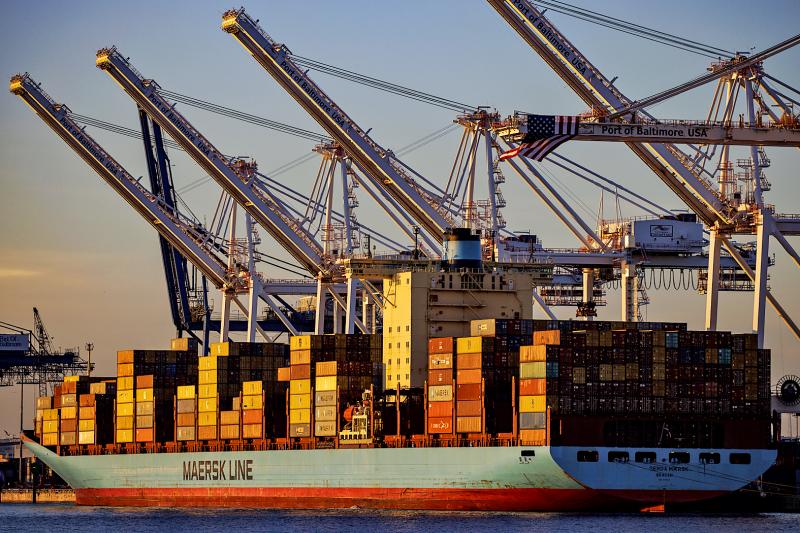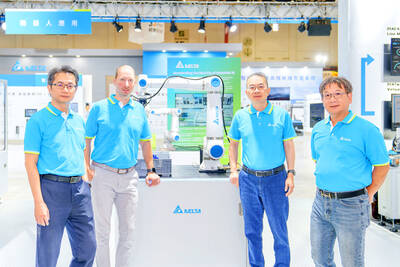A.P. Moller-Maersk A/S is no longer the world’s largest container line.
The Danish carrier has been overtaken by Mediterranean Shipping Co (MSC) in terms of capacity, data compiled by Alphaliner and published on Wednesday showed.
MSC’s fleet can carry 4,284,728 standard 20-foot containers — 1,888 more than Maersk — giving both a market share of 17 percent.

Photo: Bloomberg
Maersk, which first entered containerized trade in 1975, has held the top spot for decades. The carrier has been a pioneer in the industry, often breaking records by building the biggest ships. More recently, it has invested in vessels that can sail on carbon-neutral methanol.
Maersk still has the most capacity in terms of owned vessels: MSC has about 65 percent of its capacity from chartered ships, whereas Maersk only has 42 percent.
After struggling to make money for much of the past decade, the container shipping industry just had its most profitable year ever as COVID-19 pandemic-driven demand for consumer goods strains capacity on vessels. Freight rates out of Shanghai have jumped about fivefold over the past 18 months.
Both companies downplayed the shift.
“We never set a specific target to be the biggest,” MSC chief executive Soren Toft said in an e-mailed comment on Wednesday, adding that he was focusing on growth and profitability.
Maersk CEO Soren Skou last month reiterated in an interview that holding the top spot is not important for the Copenhagen-based company, which is investing on expanding its land-based logistics where profit margins are higher.
Closely held MSC, which is based in Geneva, Switzerland, is owned and managed by the Aponte family. In 2020, it hired Toft, formerly heir apparent at Maersk, as its CEO.
While the poaching of a potential future leader could sour relations between companies, Maersk and MSC still work together in areas such as a vessel-sharing partnership, and a blockchain-based platform for sharing and streamlining shipping information.

SETBACK: Apple’s India iPhone push has been disrupted after Foxconn recalled hundreds of Chinese engineers, amid Beijing’s attempts to curb tech transfers Apple Inc assembly partner Hon Hai Precision Industry Co (鴻海精密), also known internationally as Foxconn Technology Group (富士康科技集團), has recalled about 300 Chinese engineers from a factory in India, the latest setback for the iPhone maker’s push to rapidly expand in the country. The extraction of Chinese workers from the factory of Yuzhan Technology (India) Private Ltd, a Hon Hai component unit, in southern Tamil Nadu state, is the second such move in a few months. The company has started flying in Taiwanese engineers to replace staff leaving, people familiar with the matter said, asking not to be named, as the

The prices of gasoline and diesel at domestic fuel stations are to rise NT$0.1 and NT$0.4 per liter this week respectively, after international crude oil prices rose last week, CPC Corp, Taiwan (台灣中油) and Formosa Petrochemical Corp (台塑石化) announced yesterday. Effective today, gasoline prices at CPC and Formosa stations are to rise to NT$27.3, NT$28.8 and NT$30.8 per liter for 92, 95 and 98-octane unleaded gasoline respectively, the companies said in separate statements. The price of premium diesel is to rise to NT$26.2 per liter at CPC stations and NT$26 at Formosa pumps, they said. The announcements came after international crude oil prices

STABLE DEMAND: Delta supplies US clients in the aerospace, defense and machinery segments, and expects second-half sales to be similar to the first half Delta Electronics Inc (台達電) expects its US automation business to remain steady in the second half, with no signs of weakening client demand. With demand from US clients remaining solid, its performance in the second half is expected to be similar to that of the first half, Andy Liu (劉佳容), general manager of the company’s industrial automation business group, said on the sidelines of the Taiwan Automation Intelligence and Robot Show in Taipei on Wednesday. The company earlier reported that revenue from its automation business grew 7 percent year-on-year to NT$27.22 billion (US$889.98 million) in the first half, accounting for 11 percent

A German company is putting used electric vehicle batteries to new use by stacking them into fridge-size units that homes and businesses can use to store their excess solar and wind energy. This week, the company Voltfang — which means “catching volts” — opened its first industrial site in Aachen, Germany, near the Belgian and Dutch borders. With about 100 staff, Voltfang says it is the biggest facility of its kind in Europe in the budding sector of refurbishing lithium-ion batteries. Its CEO David Oudsandji hopes it would help Europe’s biggest economy ween itself off fossil fuels and increasingly rely on climate-friendly renewables. While